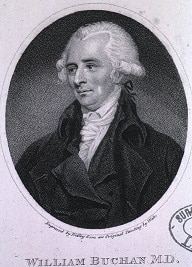Scholar’s Corner
As an early modernist, I sought to pull back my eighteenth-century topic as early as possible. I’m studying motherhood and wet-nursing in Philadelphia and London during the colonial and revolutionary periods. As I cast my research net, I tended to stop around 1800 whenever possible, fearful of being pulled kicking and screaming into the modern world. When I arrived at the Library Company, Connie King gave me many helpful suggestions and mentioned, as an aside, that William Buchan would be an obvious choice. I blushed, thinking, how could someone so obvious not even have been on my radar?

As it turns out, physician William Buchan was a major player in maternal medicine in the 18th century, but his major work on motherhood and infancy had not been published in Philadelphia until 1804. I read this volume obsessively, shocked to find themes I hadn’t noticed in earlier publications. I’d written blog posts about how authors of prescriptive literature in my period were exceedingly harsh toward poor women. Physicians recommended that mothers breastfeed their own children and cast malicious suspicion on women who did not, mounting challenges to their virtue and personal responsibility. It turned out that working-class mothers were often unable to nurse their own babies, their time being consumed almost entirely by a struggle for survival. But the privileged position of their audiences went unacknowledged by most maternal physicians… except William Buchan.
Buchan also recommends that mothers breastfeed their own children but qualifies his recommendation, “…it gives me pain to think, that there are great numbers of poor women, who do not want so much to be taught as to be enabled to discharge their duty.” He goes on to acknowledge the privileged position of a bourgeois mother who was able to breastfeed her own children, suggesting alternative solutions for poor and working-class mothers who were not so lucky. This might surprise very few of you who are familiar with antebellum America, its burgeoning class-consciousness, and its love affairs with democracy and social mobility. But for me, a historian of the genteel, bourgeois century of fashion, it was news to me. I hadn’t considered that my end date of 1800 had been masking a latent transformation in attitudes toward poor mothers.
This changes everything. All the more because Buchan was a Scot living in London. The cornerstone of my dissertation is the argument that republican motherhood was not an American phenomenon tied to the American Revolution, but rather that it was part of a much larger transformation in motherhood around the Atlantic rim. Likewise, Buchan’s work suggests that men’s new sympathy for poor mothers cannot be explained only by the rise of Jacksonian politics in the U.S. but that it was part of a much larger transatlantic movement. It is unclear how this small discovery sits with the Victorian doctrine of separate spheres or whether it translated into any positive changes for poor mothers. But I so look forward to finding out.
Sources:
William Buchan, Advice to Mothers, on the Subject of Their Own Health And on the Means of Promoting the Health, Strength, and Beauty, of Their Offspring (Philadelphia: Printed and sold by John Bioren, 1804), 266.


